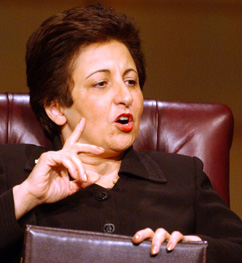Interview: Shirin Ebadi on Iraq
Nobel prize winner urges co-operation between Iran and its former enemy.

 |
| Nobel Laureate Shirn Ebadi is trying to reform family law in the Islamic Republic of Iran [GALLO/GETTY] |
Shirin Ebadi, the Iranian human rights activist and lawyer, is a woman of firsts.
In 1975, she was the first female judge to be appointed in the Iranian judiciary and in 2003 she became the first Iranian – and the first Muslim woman – to receive the Nobel Peace Prize.
More recently she has campaigned for the reform of Iran’s family law, including matters of divorce, inheritance and child protection.
Al Jazeera recently met with Ebadi in her office in the Yusef Abad district of central Tehran to discuss the fifth anniversary of the Iraq war, Iran’s approach to its embattled neighbour and the future of relations with the US.
Al Jazeera: Is Iraq a better place after the demise of Saddam Hussein, the former president, and Baathism?
Shirin Ebadi: According to Amnesty International’s latest reports, Iraq is among the most insecure countries in the world today.
According to newspaper reports, there are daily incidences of terror inflicted on innocent civilians.
Under these conditions, we must admit the situation in Iraq is worse today.
What was America’s principal motivation for invading Iraq?
This is a question for the Americans to answer.
I would start by asking a few questions in response: We know that Saddam was a dictator -but was he the only one in the world?
Unfortunately, the world is full of dictators. All oppressed nations need help.
Why was Iraq attacked? Other dictatorships do not have oil. This was Saddam’s difference.
Is the US entrenched in Iraq for the long haul?
If the US were properly entrenched in Iraq, it would be in control of security and there would not be so much violence.
Is the US a threat to Iran?
This depends on the foreign policies of both countries.
It is the foreign policies of both countries that determine whether they are friends or foes, so we have to wait and see what happens in the future.
 |
| Ebadi wants mines cleared from the Iran-Iraq border [GALLO/GETTY] |
Iran fought a war with Iraq for eight years. The conflict killed nearly one million people and wounded a further two million from both sides. Do you see the Iraqi people in general as friends or foes to Iranians?
I see the people of Iraq in the same way that I see Iran’s other good neighbours – as innocent people who have been deprived of basic security.
When Saddam invaded Iran, his military laid millions of landmines across Iran’s western regions. So far, the government of Iraq has not provided the Iranian government with maps that identify the locations of these mines.
This impedes land mine clearance operations. Now that Saddam’s regime has been replaced by an elected government, it would be appropriate for them to provide Iran with maps of mined areas.
It is estimated that there are 16 million land mines spread over two million hectares of land in Iran. Every day between two to three people are maimed or killed in Iran because of land mines.
In the midst of current political turmoil and games, Iran’s land mine problem is forgotten. We have been campaigning to bring the land mine issue and its serious hazards to the attention of public opinion here.
What is Iran’s current role or policy in Iraq?
In Iran, decisions are made behind closed doors, and since I have no part in government, I have no information on this subject. It is unclear what is the long-term impact of Iran’s current policy toward Iraq.
The ideal Iranian policy towards Iraq would be one based on the respect for the right to self-rule and territorial integrity … and cordial relations between the two countries.